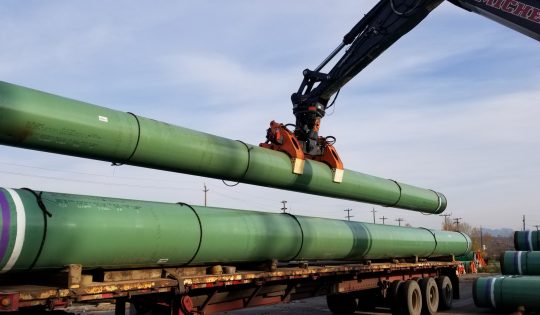The environmental groups believe that the pipeline expansion project will lead to extinction of species like the Southern Resident killer whales in the region

Image: The Trans Mountain expansion project will involve the twinning of the existing Trans Mountain Pipeline. Photo: courtesy of Trans Mountain Corporation.
Ecojustice Canada alongside Raincoast Conservation Foundation and Living Oceans Society, has filed a lawsuit with the Federal Court of Appeal challenging the Canadian government’s re-approval of the C$7.4bn (£4.52bn) Trans Mountain expansion project.
The environmental groups are set to argue that the government cannot justify its action of re-approving the pipeline expansion project which they believe will lead to extinction of species.
Previous lawsuit against the Trans Mountain expansion project
This is the second lawsuit that the trio had filed against the Trans Mountain expansion project. The three organisations prevailed in their first lawsuit in August 2018, when the Federal Court of Appeal quashed the Canadian cabinet’s previous approval of the proposed pipeline expansion project.
The ruling in the first lawsuit resulted in the National Energy Board (NEB) re-evaluating the pipeline expansion project’s marine shipping impacts, thereby halting construction.
In June 2019, the Canadian government re-approved the project based on NEB’s recommendation that the project can address environmental issues by taking up certain measures. The government also said that the pipeline expansion project is in national interest.
According to Ecojustice, there are only 76 Southern Resident killer whales left which are at risk because of the project. The environmental groups argue that the pipeline project is clearly violating the Species at Risk Act having failed to mitigate its impacts on the orcas.
Ecojustice revealed that the trio’s legal arguments will centre on protecting the salmon-eating orcas that live and forage in the Salish Sea, while driving their point that the pipeline is not compatible with a climate-safe future.
Ecojustice nature program director Margot Venton said: “Cabinet cannot justify approving a project that will lead to the extinction of a critically endangered population— legally or morally.
“The government itself says endangered Southern Resident killer whales face imminent threats under their current conditions. This iconic population simply cannot handle increased, unmitigated threats from the Trans Mountain expansion.”
The1,500km-long Trans Mountain expansion project will involve the twinning of the existing Trans Mountain Pipeline laid between Strathcona County near Edmonton in Alberta and Burnaby in British Columbia. The expansion project of the oil pipeline aims to boost the capacity of the existing pipeline system from 300,000 to 890,000 barrels of oil per day.
